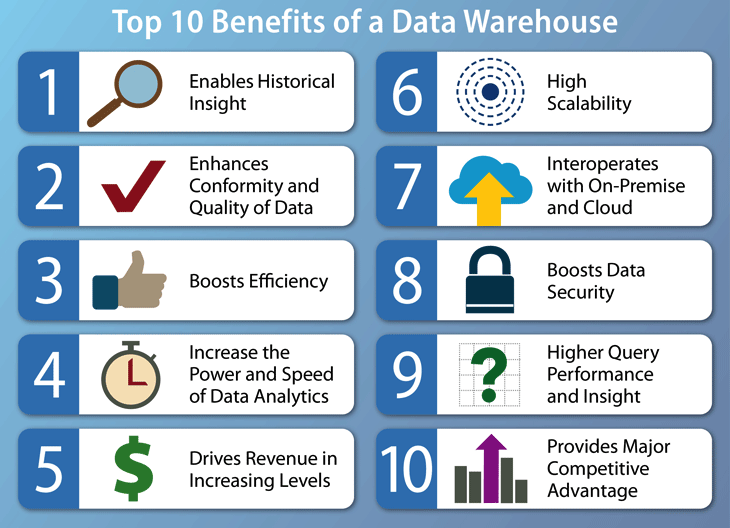
- The benefits of a data warehouse include improved data analytics, greater revenue and the ability to compete more strategically in the marketplace.
- By efficiently feeding standardized, contextual data to an organization’s business intelligence software, a data warehouse drives a more effective data strategy.
- To gain these benefits, data warehouse tools use an array of related technology, including structured and unstructured data, ETL software, and data mining.
- Undergoing rapid change, data warehouses now often use cloud computing, machine learning, and artificial intelligence to boost the speed and insight from data queries.
- The benefits of a data warehouse are attracting enormous investment. The data warehouse market is predicted to grow to some $34 billion over the next five years, from its current size of approximately $21 billion.

- No business can survive without a large and accurate storehouse of historical data, from sales and inventory data to personnel and intellectual property records.
- If a business executive suddenly needs to know the sales of a key product 24 months ago, the rich historical data provided by a data warehouse make this possible.
- Also important, a data warehouse can add context to this historical data by listing all the key performance trends that surround this retrospective research. This kind of efficiency cannot be matched by a legacy database.
- Your business generates data in myriad different forms, including structured and unstructured data, data from social media, and data from sales campaigns. A data warehouse converts this data into the consistent formats required by your analytics platforms.
- Moreover, by ensuring this conformity, a data warehouse ensures that the data produced by different business divisions is at the same quality and standard – allowing a more efficient feed for analytics.
- It’s very time consuming for a business user or a data scientist to have to gather data from multiple sources. It’s far more advantageous for this data to be gathered in one place, hence the benefit of a data warehouse.
- Additionally, if for instance your data scientist needs data to run a fast report, they don’t need to get the assistance from tech support to perform this task.
- A data warehouse makes this data readily available – in the correct format – improving efficiency of the entire process.
- Business intelligence and data analytics are the opposite of instinct and intuition. BI and analytics require high quality, standardized data – on time and available for rapid data mining.
- A data warehouse enables this power and speed, allowing competitive advantage in key business sectors, ranging from CRM to HR to sales success to quarterly reporting.
- A tech pundit opined that “data is the new oil,” referring to the high dollar value of data in today’s world. Creating more standardized and better quality data is the key strength of a data warehouse, and this key strength translates clearly to significant revenue gains.
- The data warehouse formula works like this: Better business intelligence helps with better decisions, and in turn better decisions create a higher return on investment across any sector of your business.
- Most important, these revenue gains build on themselves over time, as better decisions strengthen the business.
- In short, a high quality, fully scalable data warehouse can be seen as less of a cost and more of an investment – one that adds exponential value like few other investments that businesses make.
- The top key word in the cloud era is “scalable” and a data warehouse is a critical component in driving this scale. A topflight data warehouse is itself scalable, and also enables greater scalability in the business overall.
- That is, today’s sophisticated data warehouses are built to scale, handling ever more queries as the business grows (though this will require more supporting hardware). Additionally, the efficiency in data flow enabled by a data warehouse greatly boosts a business’s growth – this growth is the core of business scalability.
- Unlike the legacy databases of yesteryear, today’s data warehouses are built with multi cloud and hybrid cloud in mind. Many data warehouses are now fully cloud-based, and even those that are built for on-premise typically will interoperate well with the cloud-based portion of a company’s infrastructure.
- As an additional important side point: this cloud-based focus also means that mobile users are better able to access the data warehouse – this is beneficial for sales reps in particular.
- A number of key advances in the data warehouse have enhanced their security, which enhances the overall security of company data. Among these advances are techniques like a “slave read only” set up, which blocks malicious SQL code, and encrypted columns, which protects confidential data.
- Some businesses set up custom user groups on their data warehouses, which can include or exclude various data pools, and even give permission on a row by row basis.
- The constant business intelligence queries that are part of today’s business can put a major strain on an analytics infrastructure, from the legacy databases to the data marts. Having a data warehouse to more effectively handle queries removes some of the pressure on the system.
- Furthermore, since a data warehouse is specifically geared to handle massive levels of date and myriad complex queries, it’s the high functioning core of any business’s data analytics practice.
- This is absolutely the bottom line benefit of a data warehouse: it allows a business to more effectively strategize and execute against other vendors in its sector.
- With the quality, speed and historical context provided by a data warehouse, the greater insight in data mining can drive decisions that create more sales, more targeted products, and faster response times.
- In short, a data warehouse improves business decision making, which in turn gives any business a key competitive advantage
- Effectively and efficiently mining data is the very center of any modern business’s competitive strategy, and a data warehouse is a core component of this data mining.
- The ability to quickly look back at early trends and have the accurate data – properly formatted – is essential to good decision making.
- By enabling this historical overview, a data warehouse allows decision makers to learn from past trends and challenges. In essence, the benefit of a data warehouse is continuous improvement.
- Also important, a data warehouse can scale with a business; a growing business needs more and better data, and data warehouses can (with proper hardware support) grow ever more robust in their ability to handle queries.
- This scalability is driven by data warehouses deployments that are on-premise or in the cloud. And in either scenario, a data warehouse can ensure data security by using encryption and specific protection set ups that are intended to guard confidential data.
- The true business advantage of having a data warehouse is that it offers a significant increase in competitive strategy by enabling smarter, metric-based decisions on everything from product releases to inventory levels to key sales levels.
- It’s unlikely that any business can compete in today’s market without an advanced data warehouse.
Data Warehouse Sample Resumes! Download & Edit, Get Noticed by Top Employers!
Download




